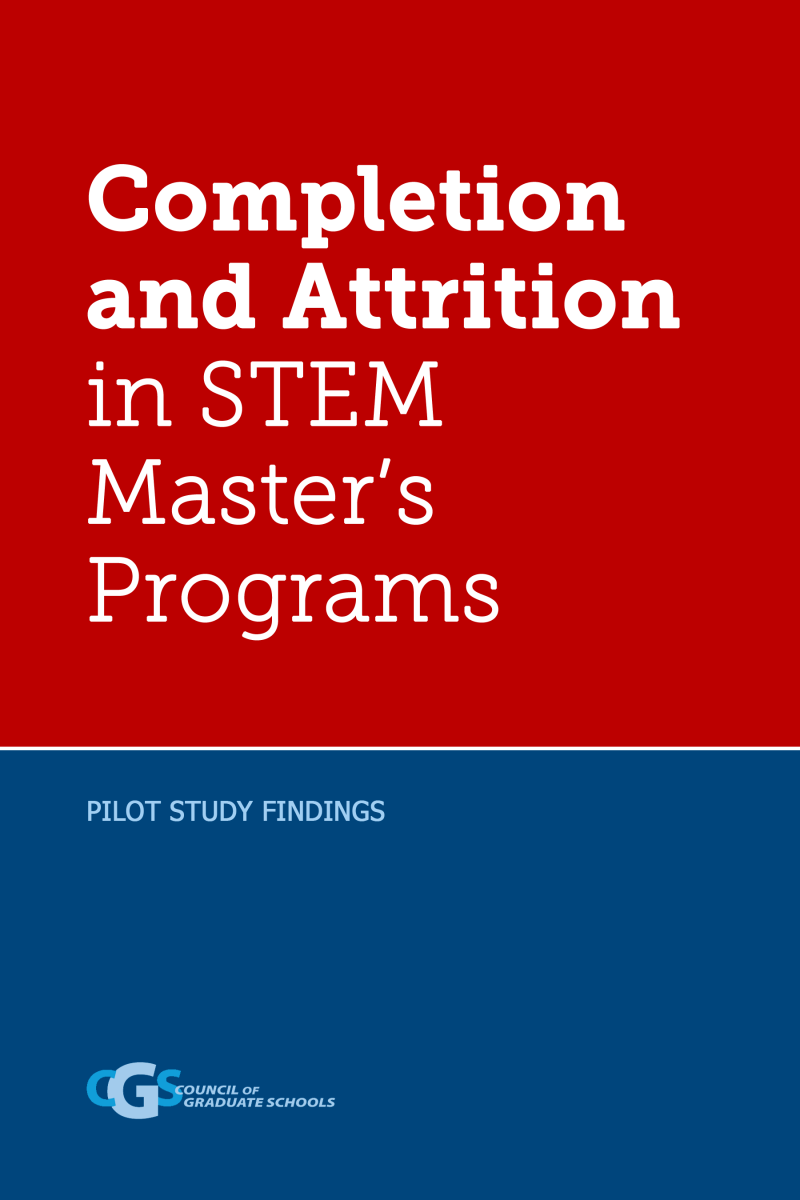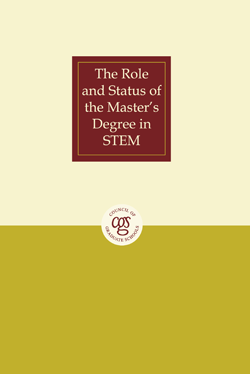You are on CGS' Legacy Site.
Thank you for visiting CGS! You are currently using CGS' legacy site, which is no longer supported. For up-to-date information, including publications purchasing and meeting information, please visit cgsnet.org.
Master’s education is the fastest growing and largest component of the graduate enterprise in the United States, yet little is known about completion and attrition rates in master’s programs and factors contributing to student success. To begin to address this gap, CGS conducted a pilot study, Completion and Attrition in STEM Master’s Programs. The project, funded by the Alfred P. Sloan Foundation, collected data for science, technology, engineering, and mathematics (STEM) master’s programs as well as MBA programs from five research partner institutions: Loyola University Chicago, Purdue University, Southern Illinois University Edwardsville, Texas A&M University, and Wright State University.
These five institutions collaborated with CGS by:
- Providing completion and attrition data on several cohorts of master’s students by program and demographic characteristics,
- Administering surveys to graduate program directors,
- Administering surveys to entering master’s students, graduating students, and those who had stopped out or dropped out or their programs, and
- Hosting site visits in which CGS project staff conducted focus group interviews with students as well as interviews with graduate program directors, university personnel, and deans to better understand reasons for enrollment, factors that contribute to student success, and promising practices to improve completion.
The study found that the most frequently cited reason for enrolling in master’s programs was to support professional aspirations. In fact, there was broad consensus among current master’s students as well as stopouts/dropouts regarding the primary reason for pursuing a master’s degree: to improve their skills and knowledge. This was followed by a desire to increase opportunities for promotion, advancement, and/or pay, and to learn more about something in which they were particularly interested.
By the end of four years, 66% of STEM master’s students completed their program of study. Whereas completion rates across STEM broad fields were remarkably similar after two, three, and four years, the completion rate for MBA students was considerably higher, at 86%. Completion rates for women enrolled in STEM master’s programs were higher than those of men at the two-, three-, and four-year periods. In contrast, completion rates for women enrolled in MBA master’s programs were lower than those of men during the same time period. Detailed completion rates about these and other demographic characteristics are available in the final publication.
With respect to attrition, 10% of STEM master’s students left their program of study after six months, 17% left after one year, and 23% left after two years. By contrast, 10% of MBA students left their program of study after two years. With only a few exceptions, patterns in attrition rates mirrored those of completion rates.
Most students, even stopouts/dropouts, reported generally high levels of satisfaction with various attributes of their master’s experience, such as program structure, advising, and instruction. The two most important factors identified as being important in contributing to the successful completion of a master’s program were motivation and non-financial family support. The factor identified as most likely to lead to the inability of a student to earn a master’s degree was interference from employment.
Resources
Institutions that did not participate in the project are welcome to implement the student surveys and use the completion and attrition data collection template. Word/Excel and PDF versions of these instruments are available below. In addition, CGS has prepared electronic versions of the surveys in SurveyMonkey, and CGS members wishing to use these may contact Hironao Okahana.
| Survey of First-year Students: | Instructions | Word | |
| Survey of Graduating Students: | Instructions | Word | |
| Stopout/Dropout Survey: | Instructions | Word | |
| Completion and Attrition Data Template: | Instructions | Excel |
Publications
 Completion and Attrition in STEM Master’s Program: Pilot Study Findings (2013)
Completion and Attrition in STEM Master’s Program: Pilot Study Findings (2013)
This monograph describes trends in completion rates, attrition rates, median time-to-degree, and median time-to-attrition for stand-alone science, technology, engineering, and mathematics (STEM) master’s programs as well as MBA programs, which served as a basis for comparison. Factors contributing to the successful completion of the master’s degree are also described, along with a list of best practices. This study, which collected data from five U.S. institutions, was funded by the Alfred P. Sloan Foundation.
 The Role and Status of the Master's Degree in STEM (2010)
The Role and Status of the Master's Degree in STEM (2010)
Completion and Attrition in STEM Master’s Programs builds upon an earlier exploratory project conducted by CGS with funding from the Alfred P. Sloan Foundation and the National Science Foundation to clarify the state of knowledge about master’s completion and attrition in STEM fields. The results of this project are detailed in a CGS monograph, The Role and Status of the Master’s Degree in STEM.
Contact




